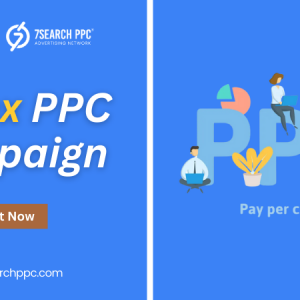In today's fast-paced digital world, marketing plays a pivotal role in the success of any business, and financial services are no exception. As competition continues to rise, financial institutions and businesses need to adopt comprehensive marketing strategies. This guide explores effective tactics to promote and market your financial business, helping you attract more clients, increase brand visibility, and improve revenue. Whether you’re a financial advisor, bank, or insurance firm, the insights shared here will help you stay ahead.

Launch Your Campaign
Why Marketing Matters for Your Financial Business
Marketing your financial business goes beyond just selling services. It’s about creating trust, educating your target audience, and positioning your business as a reliable authority in the market. Here’s why marketing is crucial for your financial institution:
- Increase Brand Awareness: With the right marketing strategies, you can reach a broader audience and increase your brand’s visibility.
- Attract New Clients: Marketing allows you to showcase your unique value proposition and attract prospective clients.
- Build Trust and Credibility: Through consistent communication and educational content, you can establish trust with your audience.
- Retain Existing Clients: Effective marketing isn’t just about gaining new clients; it’s also about maintaining relationships with your current ones.
Now, let's dive into the strategies to market your financial business effectively.
Key Strategies for Market Your Financial Business
Establish a Strong Online Presence
The foundation of financial business promotion starts with having a strong online presence. In an age where consumers search for financial advice, services, and products online, your business must be easily discoverable.
Build a User-Friendly Website
Your website serves as the digital storefront for your financial services. It should be professional, user-friendly, and optimized for search engines. Here's what to focus on:
- Clear Navigation: Ensure visitors can easily find the information they need.
- Mobile Optimization: A significant portion of users access financial services from mobile devices, so ensure your site is mobile-friendly.
- Fast Loading Speed: Slow websites deter potential clients. Optimize your website to load quickly.
- Contact Information: Make it easy for visitors to contact you by displaying your phone number, email, and social media links prominently.
Optimize for Search Engines (SEO)
Search engine optimization (SEO) is essential for increasing organic traffic to your website. When potential clients search for financial services, your website should appear at the top of the results. Key SEO strategies include:
- Keyword Research: Identify and use relevant keywords, such as "financial services ads," "grow financial business," and "financial institution advertising."
- Content Creation: Create high-quality, informative content that answers common financial questions.
- Backlinking: Increase your website’s credibility by getting backlinks from authoritative websites.
- Local SEO: Optimize for local searches by including your location in keywords and registering your business with Google My Business.
Leverage Content Marketing
Content marketing is an effective way to showcase your expertise while providing value to your audience. Financial services can often be complex, and content marketing helps simplify these topics for your clients.
Create Educational Blog Posts
Write blog posts that provide solutions to common financial problems. For example, topics could include "How to Create a Financial Plan," "Investment Strategies for Beginners," or "Understanding Mortgage Rates." Regular blogging helps improve SEO and establishes your financial business as an authority.
Use Video Marketing
Financial topics can sometimes be difficult to explain through text alone. Videos allow you to break down complex concepts into digestible formats. Consider producing explainer videos, webinars, or client testimonials.
Develop E-books and Whitepapers
For in-depth topics, create downloadable e-books or whitepapers. This not only helps establish your business as an expert but also serves as a way to gather leads by requiring an email address for downloads.
Use Social Media for Financial Business Promotion
Social media marketing has become an indispensable tool for financial institutions. It allows you to connect with your audience, share valuable content, and promote your services.
Choose the Right Platforms
Not all social media platforms are suitable for financial marketing. Choose platforms where your target audience is most active, such as LinkedIn for business professionals, Facebook for a broader audience, and Twitter for timely updates.
Engage with Your Audience
Social media is not just for broadcasting information; it’s for engagement. Respond to comments, answer questions, and be part of relevant conversations. This builds trust and demonstrates that your financial business values customer relationships.
Use Paid Social Media Advertising
Organic reach on social media is limited, especially for financial services. Paid social media ads allow you to target specific demographics and reach a larger audience. For example, you can use Facebook Ads to target users interested in financial planning or LinkedIn Ads to reach decision-makers in businesses.
Implement Email Marketing Campaigns
Email marketing is one of the most cost-effective ways to market your financial services. It allows for direct communication with potential and existing clients, offering personalized information and promotions.
Segment Your Email List
Not all clients have the same needs. Segment your email list based on client profiles, such as current customers, leads, and prospects. This allows you to send tailored messages that are more likely to resonate with each segment.
Offer Valuable Content in Emails
Rather than just promoting your services, offer value in your email campaigns. Send newsletters with helpful tips on managing finances, investment advice, or exclusive offers.
Track and Optimize Email Performance
Use tools to track the performance of your email campaigns. Analyze metrics such as open rates, click-through rates, and conversion rates. This helps you understand what’s working and what needs improvement.
Run Targeted Financial Services Ads
Paid advertising is an effective way to reach potential clients quickly. There are several types of ads you can use to promote your financial business.
Google Ads
Google Ads allows you to target users actively searching for financial services. Use keywords like financial institution advertising or "grow financial business" to create highly targeted campaigns.
Display Ads
Display ads appear on websites within the Google Display Network and can help increase brand awareness. These ads are often visual and can include promotions, educational content, or even free consultations.
Retargeting Ads
Retargeting ads allow you to target users who have visited your website but didn’t convert. By showing them personalized ads, you increase the chances of converting those visitors into clients.
Build Partnerships and Collaborations
Partnering with other businesses or influencers in the financial industry can help you reach new audiences and grow your business.
Collaborate with Financial Influencers
Influencers can help build credibility and trust. Partner with financial bloggers, YouTubers, or social media influencers who have a strong following. They can promote your services to their audience and provide endorsements.
Create Joint Webinars or Events
Host webinars or live events in collaboration with other financial experts. This allows you to tap into their audience and demonstrate your expertise.
Enhance Client Relationships Through Personalization
In the financial industry, personalized experiences are highly valued. Clients appreciate when businesses cater to their specific needs and preferences.
Use Data to Understand Client Preferences
Leverage data analytics to track client behavior and preferences. This data allows you to create personalized marketing campaigns that cater to individual clients, such as sending personalized investment options or mortgage advice.
Offer Customized Financial Solutions
Personalization goes beyond marketing. Offer tailored financial solutions based on the client’s goals, income, and risk tolerance. This level of customization sets your business apart from competitors.
Focus on Client Reviews and Testimonials
In financial services, trust is paramount. Positive reviews and testimonials from satisfied clients can significantly influence potential customers.
Collect and Display Client Testimonials
After successfully helping a client, ask for a testimonial. Display these on your website, social media, and in your email campaigns. Testimonials build credibility and help new clients feel more comfortable working with your business.
Encourage Clients to Leave Reviews
Online reviews play a significant role in building trust. Encourage satisfied clients to leave reviews on Google, Yelp, and other review platforms. Responding to reviews, whether positive or negative, shows that you value client feedback.
Use Analytics to Track Marketing Performance
No marketing strategy is complete without measuring its effectiveness. Regularly track and analyze the performance of your marketing campaigns.
Set Clear KPIs
Identify the key performance indicators (KPIs) you want to track, such as website traffic, lead generation, conversion rates, and client retention.
Use Analytics Tools
Use tools like Google Analytics, SEMrush, and social media insights to gather data on your marketing campaigns. This helps you understand what’s working and where you can make improvements.
Stay Compliant with Financial Marketing Regulations
Marketing in the financial industry comes with its own set of regulations. Ensure your marketing strategies comply with legal and regulatory requirements.
Understand Local and International Regulations
Financial marketing is heavily regulated. Make sure you are familiar with the rules in your region, as well as any international regulations that apply if you’re marketing globally.
Transparency and Disclosure
Be transparent about fees, services, and risks in your marketing materials. Failing to disclose important information can damage your reputation and lead to legal issues.
Conclusion
market your financial business requires a multi-faceted approach that combines online presence, content creation, social media, paid ads, and personalized client experiences. By implementing these strategies, your financial institution can build trust, attract new clients, and foster long-term relationships. Whether you're focusing on financial institution advertising or aiming to grow your financial business through personalized services, consistent marketing efforts
FAQs: Marketing Your Financial Business
Why is marketing important for my financial business?
Ans: Marketing is crucial for your financial business because it helps build brand awareness, attract new clients, establish trust, and retain existing customers. In the competitive financial industry, effective marketing strategies help you differentiate your services and position your business as a leader in the field.
How can content marketing benefit my financial business?
Ans: Content marketing helps educate your audience, build trust, and position your business as a thought leader. By providing valuable content such as blog posts, videos, e-books, and whitepapers, you can attract potential clients and guide them through the decision-making process.
What type of content should I create for my financial business?
Ans: You should create educational and informative content that answers common financial questions and solves problems. This includes blog posts, explainer videos, infographics, webinars, and case studies. Content that addresses financial planning, investment strategies, debt management, and insurance services can help you engage with your audience.
How can social media help in marketing my financial business?
Ans: Social media allows you to connect with your audience, share valuable content, and promote your services. It also provides a platform for engaging with customers, addressing concerns, and building a community. Paid social media ads can further help you target specific demographics.
What is the role of SEO in promoting financial services?
Ans: Search engine optimization (SEO) helps improve your website’s visibility on search engines like Google. By optimizing your content for relevant keywords such as "financial institution advertising" or "financial services ads," you can attract more organic traffic and increase your chances of reaching potential clients.
How do paid ads benefit financial businesses?
Ans: Paid ads, such as Google Ads or social media ads, allow you to target specific audiences based on demographics, interests, and search behaviors. These ads provide immediate visibility, helping you attract clients faster and increase conversions.
References
Why Is Your Average CPC So High and how to fix it?
What Is The Best CPC Ad Network?
The Anatomy Of An Irresistible Display Ads
Retargeting Ads: Reach your Target Audience With PPC Ad campaign











